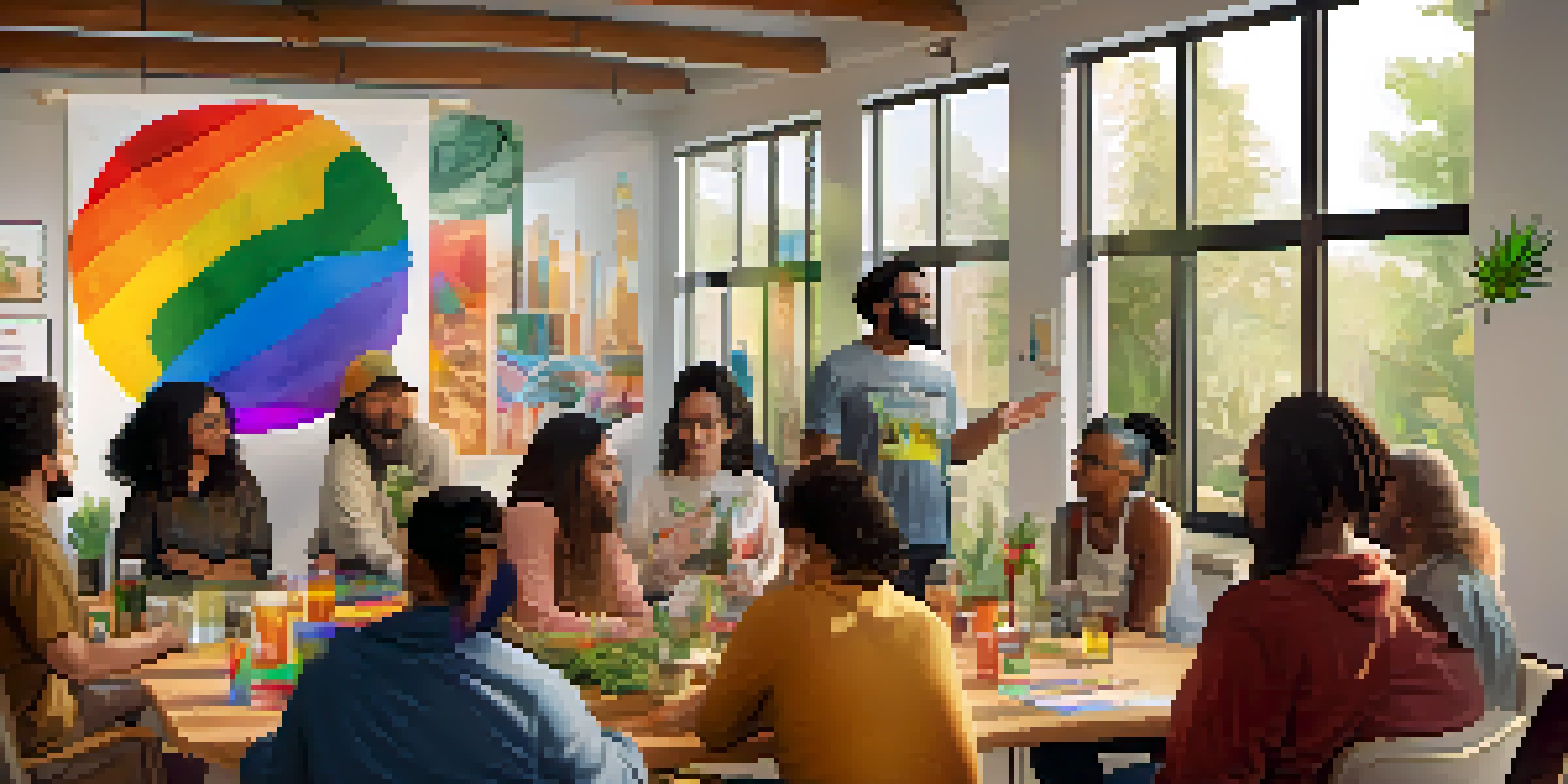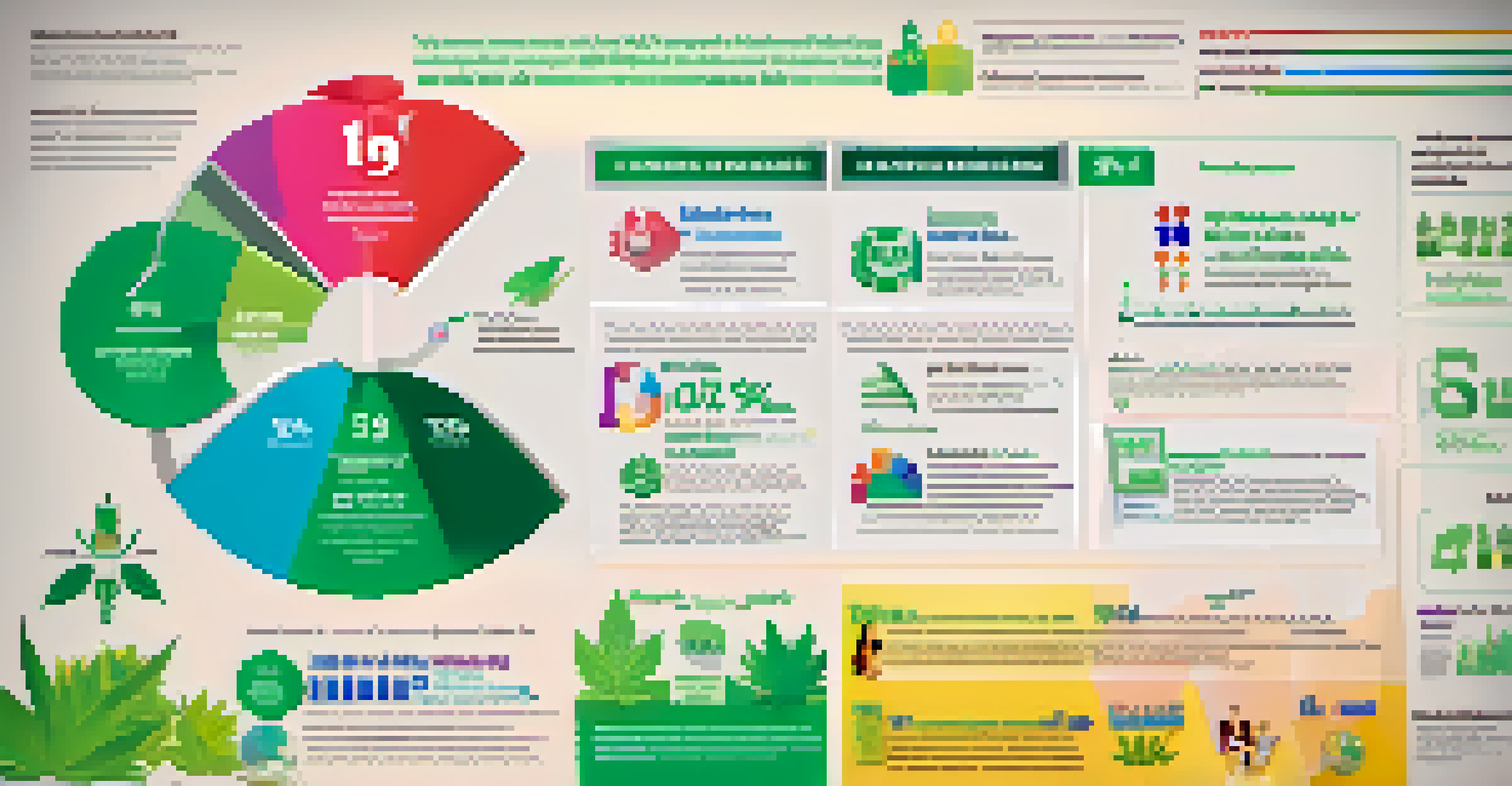Barriers to Cannabis Access for Gender Diverse Individuals

Social Stigmas Impacting Cannabis Access
Social stigmas surrounding cannabis use can disproportionately affect gender diverse individuals. Many still face societal judgment or discrimination when seeking cannabis for medical or recreational use. This stigma can lead to feelings of isolation, deterring individuals from accessing the resources they need.
Stigma can deter individuals from accessing the resources they need, creating significant barriers to care.
For example, someone who identifies as non-binary may worry about being misgendered or judged at dispensaries. This fear can create significant barriers, preventing them from seeking help or information about cannabis. When a space feels unwelcoming or hostile, it's understandable that individuals would choose to avoid it altogether.
Ultimately, combating these stigmas is crucial. Education and awareness can play a significant role in fostering a more inclusive environment, allowing everyone to access cannabis without fear of judgment.
Legal Barriers and Policy Limitations
Legal restrictions on cannabis can create obstacles for gender diverse individuals, particularly in areas where the laws are still evolving. Many may not be aware of their rights or how to navigate the legal landscape. This lack of clarity can lead to hesitance in seeking cannabis, even when it is legally available.

For instance, individuals may encounter difficulties obtaining medical cannabis if healthcare providers are not familiar with their specific needs. Furthermore, policies that do not explicitly protect gender identity can leave individuals vulnerable to discrimination in legal settings. This uncertainty can be incredibly disheartening for those who rely on cannabis for health and wellness.
Social Stigmas Hinder Cannabis Access
Gender diverse individuals often face societal judgment that discourages them from seeking cannabis for medical or recreational use.
Advocating for inclusive policies that recognize and protect the rights of gender diverse individuals is essential. By addressing these legal barriers, we can create a more equitable landscape for cannabis access.
Economic Inequities and Access to Resources
Economic disparities can also hinder access to cannabis for gender diverse individuals. These individuals may face additional financial challenges due to systemic discrimination in employment and housing. As a result, affording cannabis—whether for medical or recreational use—can be a significant hurdle.
Advocacy is a powerful tool for creating a more equitable future.
Consider someone who has faced job discrimination due to their gender identity; they may find themselves in a precarious financial situation that limits their access to necessary health resources, including cannabis. Even in legal markets, prices can be prohibitive, leaving many without the support they need.
Addressing these economic inequities is vital for improving access. By supporting programs that provide financial assistance or sliding scale services, we can help bridge the gap and ensure that everyone has access to the resources they need.
Healthcare Disparities and Medical Access
Healthcare disparities play a significant role in the access challenges faced by gender diverse individuals. Many may encounter healthcare providers who are not trained in LGBTQ+ issues or who hold biases, making it difficult to discuss cannabis as a treatment option. This lack of understanding can lead to inadequate care and missed opportunities for effective treatments.
For example, a trans person seeking medical cannabis for chronic pain may find that their doctor is not knowledgeable about the potential benefits or dosing methods. This can lead to frustration and a reluctance to seek help from other providers, reinforcing a cycle of inadequate care.
Legal Barriers Limit Awareness
Confusing legal restrictions can prevent gender diverse individuals from understanding their rights, making them hesitant to access cannabis even when it's available.
Improving training for healthcare providers on gender diversity and cannabis use is essential. By fostering a more informed healthcare environment, we can enhance the quality of care for gender diverse individuals seeking cannabis.
Cultural Competency in Cannabis Education
Culturally competent education about cannabis is crucial for meeting the needs of gender diverse individuals. Many educational resources do not consider the unique experiences and challenges faced by these individuals, thus limiting effective outreach. Without tailored information, individuals may struggle to find accurate and relevant guidance.
For instance, a gender diverse person might feel alienated by educational materials that primarily reflect cisgender experiences. This disconnect can prevent them from fully understanding the benefits and risks associated with cannabis use.
To create a more inclusive educational landscape, resources should reflect diverse perspectives. By ensuring that cannabis education is culturally competent, we can empower gender diverse individuals to make informed decisions.
Community Support and Safe Spaces
Community support is vital for fostering safe spaces where gender diverse individuals can discuss cannabis access. Many individuals may feel more comfortable seeking information and support within LGBTQ+ friendly environments. These spaces can provide a sense of belonging and understanding that traditional dispensaries or clinics may lack.
For example, community organizations that focus on LGBTQ+ issues can offer workshops or support groups focused on cannabis education and access. This can create a network of support that empowers individuals to advocate for their own needs.
Economic Inequities Affect Access
Financial challenges due to systemic discrimination can make it difficult for gender diverse individuals to afford cannabis, highlighting the need for supportive programs.
By promoting and supporting these community initiatives, we can help build a more inclusive environment for cannabis access. Creating safe spaces is essential for encouraging open conversations and reducing barriers.
Intersectionality and Unique Challenges
Understanding the intersectionality of identities is crucial when discussing barriers to cannabis access. Gender diverse individuals often face multiple layers of discrimination based on race, socioeconomic status, and other identities. These intersecting factors can compound the challenges they experience in accessing cannabis.
For instance, a gender non-conforming person of color may encounter not only social stigma surrounding their gender identity but also racial discrimination in cannabis spaces. These compounded barriers can create an overwhelming sense of helplessness and isolation.

Addressing these intersectional challenges requires a nuanced approach that considers the diverse experiences of individuals. By recognizing and responding to these complexities, we can work toward more equitable access to cannabis for all.
Advocacy for Inclusive Cannabis Policies
Advocating for inclusive cannabis policies is essential for eliminating barriers faced by gender diverse individuals. This includes pushing for legislative changes that protect against discrimination and ensure equitable access to cannabis resources. Engaging in advocacy can help amplify the voices of those who have been marginalized in the cannabis conversation.
For example, supporting organizations that work towards cannabis justice can provide individuals with the tools to advocate for their rights. This collective effort can lead to meaningful change in policies and practices that affect access.
By coming together as a community to advocate for inclusive policies, we can help dismantle the barriers that prevent gender diverse individuals from fully experiencing the benefits of cannabis. Advocacy is a powerful tool for creating a more equitable future.